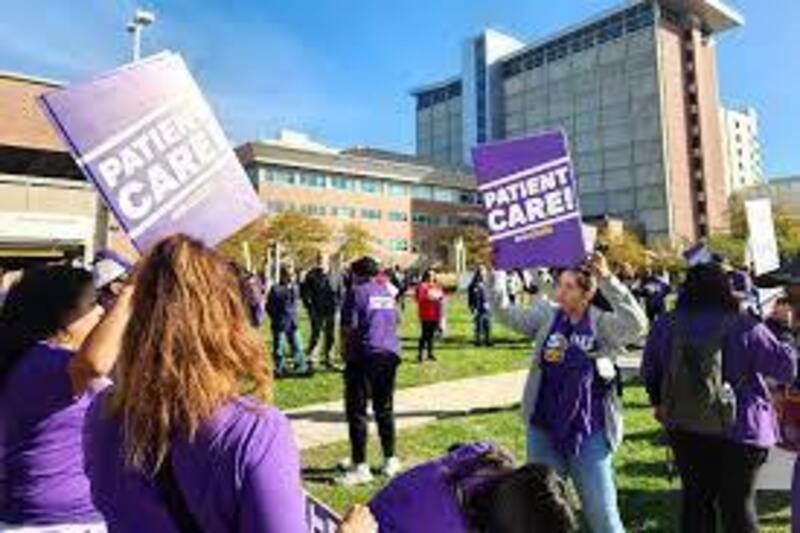75,000 Kaiser Permanente Workers Walk Off the Job in Historic Strike
More than 75,000 unionized Kaiser Permanente employees, one of the nation’s largest non-profit health providers, walked off the job on Wednesday, marking the largest health care worker strike in U.S. history.
The striking employees in California, Colorado, Washington, Virginia, Oregon, and Washington, DC are represented by a coalition of unions that account for 40 percent of Kaiser Permanente’s total workforce. The overwhelming majority of striking workers are located in states on the West Coast. The strike began at 6:00 a.m. local time and will last until 6:00 a.m. on Saturday.
Wednesday concluded without a settlement between the coalition and Kaiser Permanente, but “a number of tentative agreements in bargaining” were reached, according to a statement from Kaiser Permanente.
“While we have not yet reached a contract settlement, we have been able to reach a number of tentative agreements in bargaining, and our offers to date address the unions’ priorities,” the statement reads.
Kaiser Permanente says it will collaborate with union leaders “to resume negotiations as soon, if possible.”
Caroline Lucas, a spokesperson for the Coalition of Kaiser Permanente Unions, issued the following statement on Wednesday evening: “Frontline healthcare workers are awaiting a substantive response from Kaiser executives regarding some of our top priorities, such as safe staffing, outsourcing protections for incumbent healthcare workers, and fair wages to reduce turnover. The coalition’s healthcare professionals remain available for meetings at any time. At present, the strike continues, and there are no scheduled sessions.”
The unprecedented strike comes at a time of increased labor activity across the United States, with tens of thousands of workers from a variety of industries taking to the picket lines to demand higher wages and benefits. However, in the aftermath of the pandemic, health care workers have fought for safer and more secure work environments. They are demanding that staffing levels be increased, arguing that current staffing shortages compromise patient care and push many employees to their breaking point.
Who is striking?
On the picket lines are registered nurses, dietitians, receptionists, optometrists, and pharmacists. The employees’ union contracts expired at 11:59 p.m. Pacific Standard Time on September 30. According to James Santos, field coordinator for the coalition of Kaiser unions in Virginia, negotiations between the union and Kaiser Permanente proceeded on Wednesday, but no agreement to avert the strike has been reached as of yet.
Health care employees in the United States are on strike due to labor practices.
75,000 Kaiser Permanente health care employees are anticipated to go on strike in dozens of locations across the United States, primarily in California, Colorado, and the Pacific Northwest.
Facilities in Virginia and Washington, DC, the majority of which are not open 24 hours a day, established picket lines at 7:00 a.m. ET.
Tuesday at 9 p.m. PT, Kaiser issued the following statement: “Our team is available 24/7 to continue negotiations with the coalition until we reach a fair and equitable agreement. We remain optimistic that there is still time to find agreement before any of the work stoppages called by the coalition unions commence at 6 a.m. on Wednesday.”
As 6 a.m. rolled around on the West Coast, however, no agreement had been reached, and employees headed to the picket lines.
The strike is short-term. On October 7 at 6 a.m. local time, Kaiser Permanente employees will return to work in each state that joined the strike. According to communications from the coalition’s largest union, SEIU-UHW, a “longer, stronger” strike could occur in November if an agreement is not reached between the coalition and Kaiser Permanente after this strike effort.
What exactly are workers fighting for?
Staff shortages, according to striking workers, have left them feeling overburdened and exhausted. Kaiser Permanente announced in a recent statement that it has agreed to accelerate hiring, with a goal of hiring 10,000 new union-represented employees by the end of 2023.
The union coalition is requesting higher pay, a strategy from Kaiser Permanente management to address chronic staff shortages, protections against outsourcing, and earlier notification when management recalls remote employees to return to in-person work.
According to an update by SEIU-UHW, progress was made in negotiations prior to the start of the strike, but management and the unions remain far apart regarding employee compensation.
